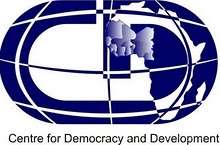Centre for Democracy and Development
 | |
| Abbreviation | CDD |
|---|---|
| Formation | 1997 |
| Type | Think tank |
| Purpose | Democracy, human rights, Peace and Human Security |
| Headquarters | House 16, A7 Street Mount Pleasant Estate (CITEC), Jabi-Airport Road, Mbora District, Abuja, Nigeria |
| Location |
|
Region served | West Africa |
| Website | http://www.cddwestafrica.org/ |
The Centre for Democracy and Development (CDD) was established in the United Kingdom in 1997 and subsequently registered in Lagos, Nigeria, in 1999. The organisation which aims to promote the values of democracy, peace and human rights in Africa, particularly in the West African sub-region.[1]
The Centre was established to mobilise global opinion and resources for democratic development and provide an independent space to reflect critically on the challenges posed to the democratization and development processes in West Africa, and also to provide alternatives and best practices to the sustenance of democracy and development in the region.
History
The CDD was founded in 1997 in London at a time when Nigeria was under military rule. Its first activity was to organize a roundtable discussion on the future of democracy in Nigeria.[2] One of the founding members was Biko Agozino, a criminologist whose books explored the impact of colonization on the way racial and ethnic minorities are treated by justice systems worldwide.[3] The Center works on policy-oriented scholarship on introducing and improving democratic processes, improving economic governance, safety and development throughout Africa.The Centre remains focused on capacity building work, policy analysis and advocacy, and as a research reference point on democratic governance, human security and people-centred development in the region. It has remained a critical bridge building institution between policy makers, civil society activists and academics in West Africa.[4]
Activities
CDD has offices in Lagos and Abuja, Nigeria, and an international office in London. The center conducts research on democratization and good governance, and also trains groups and individuals who are promoting democracy and development in the region.[5] In collaboration with the Kituo Cha Katiba (East African Centre for Constitutional Development) the CDD has run a capacity building project funded by the Ford Foundation. The project sponsors East African Women Lawyers for Graduate Masters Programs, particularly those who want to use the law as an instrument of social change.[6]
Promoting democratic accountability through election pledge monitoring
Buharimeter project, supported by the Open Society Initiative for West Africa (OSIWA), tremendously heightened public conversation on holding President Muhammadu Buhari (PMB), and the ruling party, the All Progressives Congress (APC), accountable to over 200 election pledges made in the prelude to the 2015 general elections in the year under review. Sequel to the release of One Year Assessment report, its key findings were referenced in numerous opinion pieces and articles authored by political commentators and scholars. For example, in July 2016, Emmanuel Ugwu, in his article titled ‘Why Buhari Must Watch Buharimeter ’,[7] drew the attention of President Buhari to the importance of Buharimeter as a tool for objective assessment of its administration. According to him: ‘Buhari ought to face the mirror of his campaign promises every day of his finite tenure. He should respect the Buharimeter as the reflection of his vows and accomplishments. This will furnish him with the right perspective he needs to secure a befitting legacy.’[7] Buharimeter’s one-year report did provide a synopsis of citizens’ perception on the implications of the actions of the government and also revealed the degree to which Nigerians were aware of campaign promises and the actions carried out to achieve them. Knowledge about existence the of Buharimeter and its findings have taken a global outlook. Aside from highlighting how the initiative was widely reported internationally, Buharimeter is now listed as one of the promise tracking initiatives on the Duke Reporters' Lab. The one year report was the fifth report released since the launch of the project. Others include 30 days, 60 days, 100 days, 7 months’ and mid-term assessment reports published in July 2017, and can be viewed on Buharimeter reports. By May 2018, President Muhammadu Buhari will be 3 years in office, the Buharimeter team at the Centre for Democracy and Development is expected to release a third-year report which should score the performance of Nigeria's President after 3 years.[8][9][10]
References
- ↑ "Home". Centre for Democracy and Development. Retrieved 2011-06-27.
- ↑ "Centre for Democracy and Development (CDD)". Africa Governance Institute. Archived from the original on 2013-04-15. Retrieved 2011-06-27.
- ↑ Biko Agozino (2006). "About The Author". ADAM: Africana Drug-Free Alternative Medicine. Lulu.com. p. 145. ISBN 1-4116-6915-0.
- ↑ "Jibrin Ibrahim" (PDF). Institute of Federalism, University of Fribourg. Archived from the original (PDF) on 2011-08-13. Retrieved 2011-06-27.
- ↑ "Member Institutes: Centre for Democracy and Development (CDD)". Network of Democracy Research Institutes. Archived from the original on 2012-03-26. Retrieved 2011-06-27.
- ↑ "Centre for Democracy and Development (CDD) Nigeria". Peacebuilding Portal. Archived from the original on 2011-10-09. Retrieved 2011-06-27.
- 1 2 "Why Buhari Must Watch Buharimeter By Emmanuel Uchenna Ugwu". Sahara Reporters. 7 February 2016. Retrieved 2017-08-10.
- ↑
- ↑ "Fact- Checking - Duke Reporters' Lab". Reporterslab.org. Retrieved 2017-08-10.
- ↑ "BuhariMeter: Tracking President Buhari's Promises". Africa Check. 18 June 2015. Retrieved 2017-08-10.